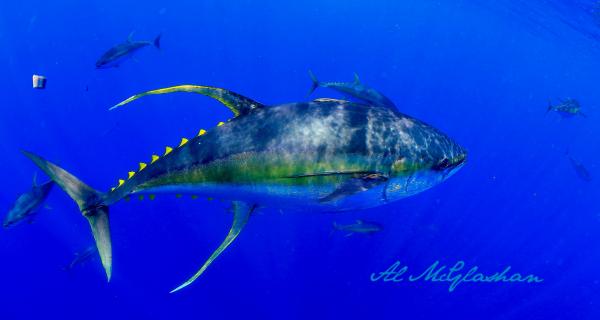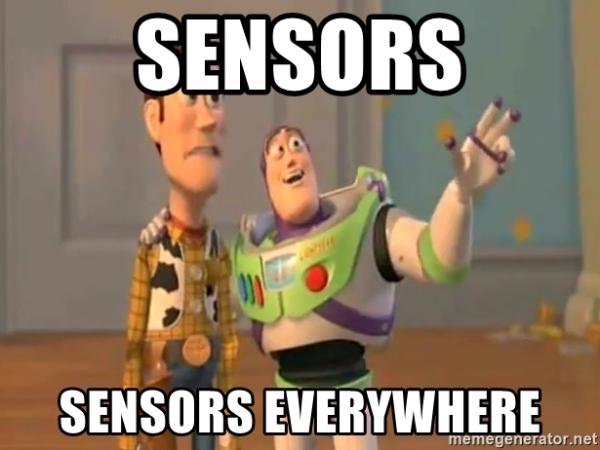How a tuna from Fiji confirmed my "blockchain for food" doubts
I only saw today a post published a few weeks ago, titled “Following a Tuna from Fiji to Brooklyn—on the Blockchain”.
Its author describes how she could actually “track across the globe, via the Ethereum blockchain” the yellowfin tuna she had just eaten, and how the same procedure could be used track any other food. As far as I am concerned, the most relevant parts of that article are these (emphasis mine):

<u><em><strong>CAPTION:</strong>
<a href="https://commons.wikimedia.org/wiki/File:Al_mcglashan_tuna.jpg" target="_blank">Quick! Blockchain me please! (source: Al McGlashan via Wikimedia Commons)</a>
</em></u>
A: Blockchain tech, along with other tools like RFID chips and internet-connected sensors (1), could be used to track the status of a shipment in real time. Imagine, for example, a sensor that monitors the temperature of a container of bananas, ensuring that they don’t begin to rot. The data is entered into the blockchain, where it can be viewed by anyone (2) and cannot be altered. If the bananas do go bad, everyone will be able to tell when it happened and why… and any attempt to alter the data [provided by the sensors] would be detected…
B: A trickier problem might be if someone reports that a shipment contains avocados, but it’s also secretly carrying a kilo of cocaine. The hope is that the blockchain-powered platform will have a number of fail-safes in place, like maybe a sensor (1) that goes off when a container is tampered with.
C: Two major hurdles to bringing blockchain technology to supply chains… have to do with the tech itself. The first is simply convincing everyone in the supply chain… The second problem is governance. Because blockchains aren’t centralized, it’s difficult to decide how they should be managed… It’s likely going to take years to solve these issues and to square them with government regulators (3).
What this blockchain tuna from Fiji confirms
Eating local fish, rather than tuna coming from half the planet away, would be immensely easier to track, even if one did not care about sustainaibility (according to WWF, yellowfin Tuna status is “near threatened”). But let’s ignore such minutiae, and focus on blockchaining tuna, or food in general.

Digital modernization of agriculture and fishing is needed, but it should be as bottom-up and diverse as possible. This said, point 1 above confirms what I already explained here: you simply cannot give any meaningful guarantee that food was not tampered with, unless you completely automatize all its harvesting and processing (as in “goodbye millions of jobs”).
And even if you solved that problem with Universal Basic Income, you should still fill the world with so many, hardly recyclable electronics to make plastic pollution seem a joke. Assuming, of course, that blockchain/sensor guaranteed food is compatible with Western lifestyles in the first place.
Points 2 and 3, instead, are what I recently called the biggest, untold problem of blockchain in agriculture: pollution aside, before covering small farmers and fishermen with blockchains, it is absolutely necessary to reboot regulation of those sectors.
Blockchain is easy (when it is really necessary, that is)
Technology is the very last of the problems here. I sincerely hope the industry doesn’t succeed to sell too many blockchained sensors before this reality checks in.
Who writes this, why, and how to help
I am Marco Fioretti, tech writer and aspiring polymath doing human-digital research and popularization.
I do it because YOUR civil rights and the quality of YOUR life depend every year more on how software is used AROUND you.
To this end, I have already shared more than a million words on this blog, without any paywall or user tracking, and am sharing the next million through a newsletter, also without any paywall.
The more direct support I get, the more I can continue to inform for free parents, teachers, decision makers, and everybody else who should know more stuff like this. You can support me with paid subscriptions to my newsletter, donations via PayPal (mfioretti@nexaima.net) or LiberaPay, or in any of the other ways listed here.THANKS for your support!